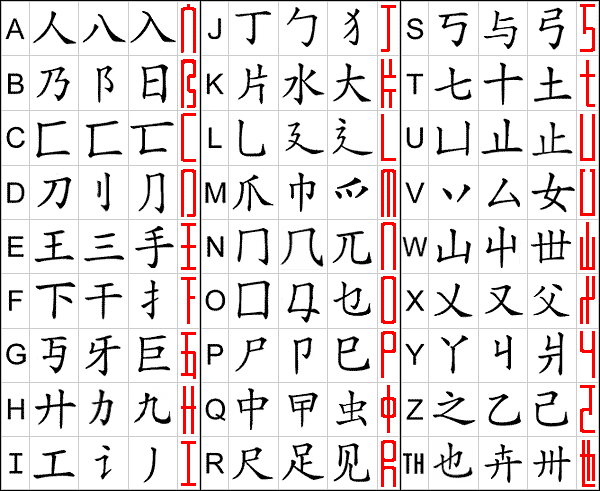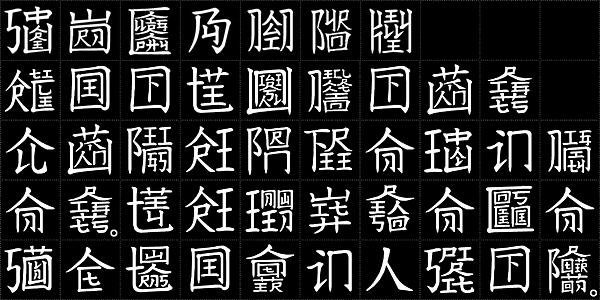The Square Word Calligraphy system presented on this page and developed by Dr. David B. Kelley in 2012 is a new version of the original Square Word Calligraphy (英文方块字) system developed in 1994 by the Chinese artist, Xu Bing (徐冰).
Xu Bing attempted to fuse written English and written Chinese. He designed a system whereby English words are written in the format of a square, so as to resemble the consistent size of all Chinese characters. To achieve this, he utilized the fact that some of the 214 different radicals (component parts) used to write Chinese characters also resemble the letters in the Roman alphabet. Based on the similarities of certain of the Chinese radicals and the Roman alphabet, Xu Bing created his own Sino-Roman alphabet. Using those Sino-Roman symbols, he began to write English words by combining the letters of individual English words into squares, with all the letters of any English word present, but formatted into a square shape. Modern Korean writing does this with the 24 letters of the Hangul alphabet. The result is a Chinese-like grouping of symbols into single "characters" (or English "words") of the same size.
David's version of Square Word Calligraphy differs from the original system by creating a different set of symbols from the 214 radicals, thus forming a different Sino-Roman alphabet. David's alphabet uses different symbols because he thought that ten of Xu Bing's original Sino-Roman alphabetic symbols could be improved by replacing them with more Chinese-like ones, specifically the symbols for "A", "D", "E", "H", "K', "M", "Q", "R", "V" and "Z". David's goal is to aim for a more consistently Chinese-like appearance to SWC words.
Both Xu Bing's and David's versions initially appear indecipherable to English speakers; however, once they see the alphabet chart, they can read everything easily. Yet, many people say they feel really strange because of the sudden complete awareness of comprehension, after being so sure it was unreadable. Use the Sino-Roman alphabet chart below and see for yourself whether you can read the example text, and how quickly.
Notable features
- Type of writing system: alphabet
- Direction of writing words: left to right in horizontal or vertical lines. The letters do not follow one another linearly but are fitted together to form a square shape.
- Used to write: English or any language employing the Roman alphabet.
Here is an example text.
Transliteration
Square Word Calligraphy by David B Kelley
Article 1 of the Universal Declaration of Human Rights
All human beings are born free and equal in dignity and rights. They are endowed with reason and conscience and should act towards one another in a spirit of brotherhood.
Links
Information about Xu Bing and his calligraphy
David's website


No comments:
Post a Comment